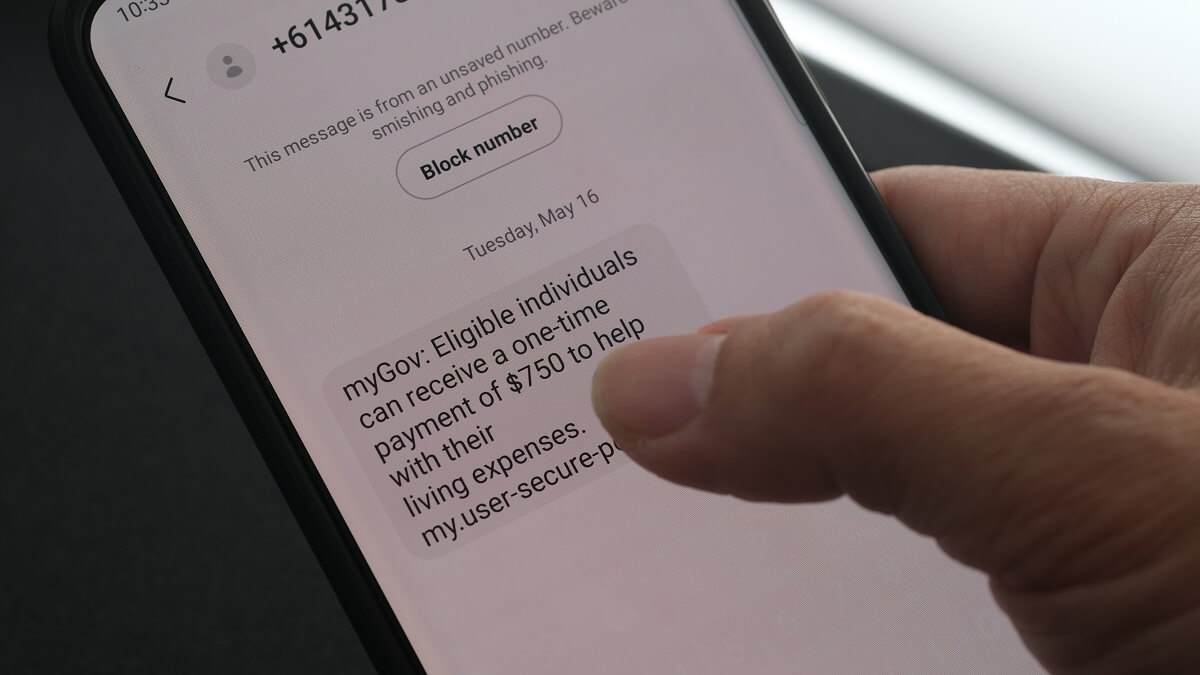Australia’s communications regulator is warning that criminals are targeting cash-strapped Aussies by attempting to impersonate government agencies through a new SMS-based scam. Here’s what you need to look out for.
The Australian Communications and Media Authority (ACMA) has issued a warning to all mobile phone users of a ‘cost-of-living’ government impersonation scam it is seeing more frequently, adding even more financial pressure to Aussies doing it tough.
The scam uses text messages purporting to be from a number of different government agencies including myGov, Centrelink, Medicare and the Australian Tax Office.
Messages are usually urgent, telling you are owed a refund or need to log in to change your personal information. The messages then usually ask you to click a link to proceed with the request.
“ACMA is aware of reports of scammers taking advantage of cost-of-living pressures by sending messages posing as government agencies and offering fake payments and refunds,” ACMA says in its warning.
“These scams will ask you to click on links that lead to convincing websites to receive a refund or payment. These websites are fake. Other examples may ask you to update your personal details via a link or attachment, promising payment once completed.”
Ultimately, these messages are designed to trick you into handing over money, financial details or other personal information to the scammers.
What to do if you think you’ve received this scam text
ACMA says that if you believe you’ve received one of these scam messages, do not click any links the SMS provides. Also don’t rely on any information conveyed in the message.
Instead, you should call or message the agency directly through official channels to find out if the text is legitimate.
How to spot a scam text message
Sometimes it can be easy to spot a dodgy text, because of spelling and grammar errors. Scammers are getting increasingly more sophisticated in their attempts and can now clone, or ‘spoof’, real phone numbers and websites to make the text appear more legitimate.
These messages can even appear in the same text message chains you have going with the real agency or organisation, making these scams even harder to spot.
Scamwatch, the national anti-scam awareness body, says text scams are the most common form of scam and target anybody who owns a mobile phone (so almost everybody).
“Text or SMS was the most reported contact method for scams last year,” says Scamwatch.
“Scam messages sound urgent to get you to act quickly. They often have a link that will take you to a scam website. Scammers can steal any personal information entered on these scam websites and use it to take your money or commit fraud in your name.”
Scamwatch says the first step is to stop and think about the following questions when you receive a text message:
- Is the message asking you to take immediate action on something?
- Are you being asked to make a payment or transfer money?
- Have you received a request to click on a link or call a number?
- Does the message ask you to log on to an online account with your username and password or to provide other personal information?
To instil a sense of urgency and get you to rush into acting, the text might also claim something urgent like your accounts have been hacked or involved in fraud; there’s a problem with your refund payment or even threats to stop a service or charge a fine if you don’t act now.
It’s getting harder and harder to spot obvious scams these days, but the key is to take your time with every text message. Any requests for money or personal details should be met with immediate suspicion.
The best defence against these types of scams is not falling for them in the first place, so make sure you’re paying attention to the messages you receive.
Have you received a text from a ‘government agency’ recently? How did you handle it? Let us know in the comments section below.
Also read: What psychological tactics do scammers use?

